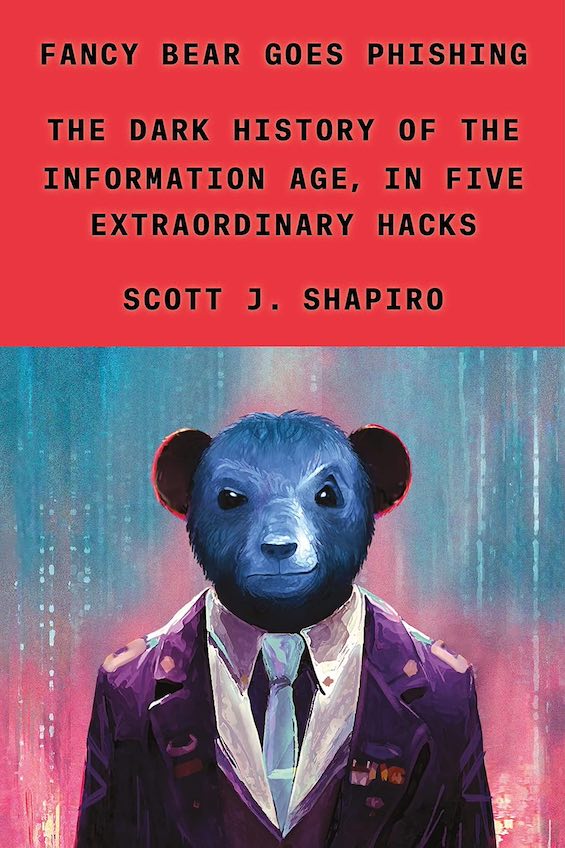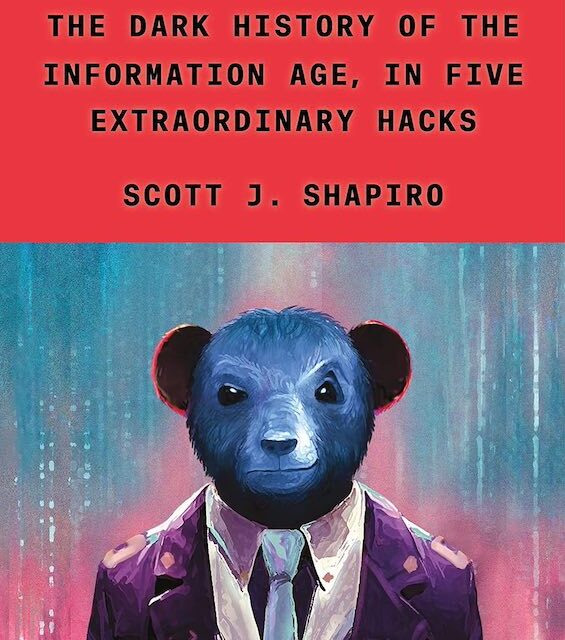
As Scott Shapiro points out in the opening pages of his history of hackers and hacking, “there are at least 15 billion computers for only 8 billion people.” And most of us eight billion seem to live in constant fear that some malicious 15-year-old kid in Belarus is going to wipe out everything on our computer. But the Yale Law School professor has studied the subject in depth, and assures us, with only a slight tremble in his voice, that it’s not as bad as we think. His new book, Fancy Bear Goes Phishing, traces the emergence of hackers, both good and bad—or “white” and “black” in industry jargon—since the earliest days of the internet half a century ago.
Estimated reading time: 5 minutes
Hackers and hacking, and why they do what they do
Shapiro’s book is subtitled The Dark History of the Information Age, in Five Extraordinary Hacks. But it’s neither a “history of the Information Age” nor an account of “five hacks,” extraordinary or otherwise. The book is filled with examples of destructive hacks carried out by well-meaning computer science graduate students, Russian military intelligence, money-grubbing computer criminals, and alienated teenagers around the world. Five? More like ninety-five. And it does at times seem a little cluttered. But no matter. If you want to understand why and how our computers are vulnerable to hacking, and why nobody ever manages to stop it, this is the book for you.
Fancy Bear Goes Phishing: The Dark History of the Information Age, in Five Extraordinary Hacks by Scott J. Shapiro (2023) 432 pages ★★★★☆

The three dimensions of hacking
Shapiro is a professor of philosophy, and he dissects his subject with all the tools in the logician’s toolbox. He analyzes hacking in three dimensions.
- First is downcode, the symbols that computer programmers type into their machines. Simple enough.
- Then there’s upcode, which is “what’s going on above those fingertips—from the inner operations of the human brain to the outer social, political, and institutional forces that define the world around us.” This includes not just the formal laws that regulate hacking from above, but the norms that hackers have devised informally, the unusual propensities of the human mind, and the incentives that drive the software market.”
- And finally Shapiro describes metacode. He explains: “Hackers, as I’ll show, do not just hack downcode—they exploit philosophical principles, which I call ‘metacode.’” Unfortunately, it was never clear to me what those “philosophical principles” are. I found the concept of metacode hard to distinguish from upcode. After all, law is merely a concrete expression of philosophical principles. And the “norms that hackers have devised informally” embody libertarian principles.
A highly technical subject made easier to understand
If the whole subject of hackers and hacking confuses you, Scott Shapiro’s book will help. All along the way he translates the inevitable jargon of the insular fraternity of computer scientists into something much closer to conversational English. If you pay attention, you’ll even learn how computers work. And you’ll definitely become familiar with the many varieties of malware. You’ve heard of viruses? Worms? Bots? Well, they’re just three of many types of insidious code that exploits the vulnerabilities in computers. But don’t worry. Shapiro will sort it all out for you.
About the author

Scott J. Shapiro’s bio on the Yale Law School website reads in part as follows: “Scott Shapiro is the Charles F. Southmayd Professor of Law and Professor of Philosophy at Yale Law School. His areas of interest include jurisprudence, international law, constitutional law, criminal law and cybersecurity. Shapiro is an editor of Legal Theory and the Stanford Encyclopedia of Philosophy. He is also the founding director of the Yale CyberSecurity Lab, which provides cutting-edge cybersecurity and information technology teaching facilities. He earned B.A. and Ph.D. degrees in philosophy from Columbia University and a J.D. from Yale Law School.”
Fancy Bear Goes Phishing is Shapiro’s fourth book. It’s based on his popular course on hacking at Yale. He was born and raised in New Jersey, where his father was employed as a mathematician at Bell Labs.
For related reading
Shapiro cites one book as exemplifying the alarmist and exaggerated accounts that seem to dominate the news: The Perfect Weapon: War, Sabotage, and Fear in the Cyber Age by David E. Sanger (Espionage, sabotage, economic warfare, and cyber weapons).
I’ve also reviewed Cyber War: The Next Threat to National Security and What to Do About It by Richard. A. Clarke and Robert K. Knake (An authoritative insider’s take on the threat of cyber war) and Fatal System Error: The Hunt for the New Crime Lords Who Are Bringing Down the Internet by Joseph Menn (Criminals are stealing trillions through the Internet).
You might also care to browse through My 10 favorite books about business history and Science explained in 10 excellent popular books.
And you can always find my most popular reviews, and the most recent ones, on the Home Page.



























